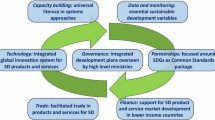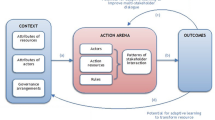Abstract
The growing demand for port efficiency is shifting port ownership and control of strategic operational activities from purely public ports to private port models. This study assessed the ownership models of seaports and the effects of the model changes on port /economic growth, social life and the port environment from 1980 to 2020. Semi-structured interviews were employed in data collection. System dynamics modelling were applied to simulate port ownership system over a period to gain insight into the potential consequences of current port ownership decisions on structure behaviour of the port system in Ghana. The findings suggest that nationalism, systemic corruption and the quest for a political legacy have influenced port ownership models in Ghana with potential unintended consequences on port/economic growth, social life and the port environment. This study contributes to unravelling the motive for selecting port ownership/management models in Ghana over the past 40 years. The insights gained could lead to industry-wide policy reforms that could influence future decision-making towards sustainable port and economic growth. This could also inform the choice of the strategic management approach taken to make Ghanaian ports a preferred option in the new trade block (the African Continental Free Trade Area).

Source: Author’s data (2022)

Source: Author’s data (2022)

Source: Author’s data (2022)

Source: Author’s data (2022)






Similar content being viewed by others
References
Abdullah J, Ahmad Z, Shah RNHRA, Anor N (2012) Port city development and quality of life in Pasir Gudang Port, Johor, Malaysia. Procedia Soc Behav Sci 35:556–563
Acciaro M, Renken K, Dirzka C (2020) Integrated port cities: the case of Hamburg. European port cities in transition: Moving towards more sustainable sea transport hubs, pp 287–301
Akinyemi YC (2016) Port reform in Nigeria: efficiency gains and challenges. GeoJournal 81(5):681–697
Baburajan V, d Silva JDA, Pereira FC (2020) Open-ended versus closed-ended responses: a comparison study using topic modelling and factor analysis. IEEE Trans Intell Transp Syst 22(4):2123–2132
Baird, A. (1997, September). Port privatization: an analytical framework. In Proceedings of International Association of Maritime Economist Conference. City University: London, pp 22-24
Bala BK, Arshad FM, Noh KM (2017) System dynamics. Model Simul 274
Bassett K (1993) British port privatization and its impact on the port of Bristol. J Transp Geogr 1(4):255–267
Brooks MR, Cullinane K (eds) (2006) Devolution, port governance and port performance. Elsevier
Brooks MR, Farrell S (2019) Port policy: are the Goss principles still relevant today? Int J Shipp Transp Logist 11(5):405–421
Brooks MR, Pallis AA (2008) Assessing port governance models: process and performance components. Marit Policy Manag 35(4):411–432
Brooks MR, Pallis AA (2012) Port governance. The Blackwell Companion to Maritime Economics, pp 491–516
Buor JK (2015) Applying system dynamics modelling to building resilient logistics: a case of the Humber Ports Complex. University of Hull
Cahoon S, Pateman H, Chen SL (2013) Regional port authorities: leading players in innovation networks? J Transp Geogr 27:66–75
Carlucci F, Cirà A, Costanza F (2020) Is the rapid increase in maritime transports a threat or an opportunity for port cities? A system dynamics analysis. Econ Policy Implications Artif Intell 31–41
Chalfin B (1996) Market reforms and the state: the case of shea in Ghana. J Mod Afr Stud 34(3):421–440
Chalfin B (2010) Recasting maritime governance in Ghana: the neo-developmental state and the Port of Tema. J Mod Afr Stud 48(4):573–598
Chung TW, Jeon JW (2021) System dynamics-based prediction of North Korean port volumes. Asian J Shipp Logist 37(4):337–344
Coto-Millán P, Fernández XL, Hidalgo S, Pesquera MÁ (2016) Public regulation and technical efficiency in the Spanish Port Authorities: 1986–2012. Transp Policy 47:139–148
Creswell JW, Poth CN (2016) Qualitative inquiry and research design: choosing among five approaches. Sage publications
Cuevas Valenzuela H, Torres-Salinas R, Grosser G, Félez-Bernal J, Budrovich J (2022) Port-city symbiosis and uneven development: a critical essay on forestry exports and maritime trade from Coronel, Chile. Marit Econ Logist 1–25
de Langen PW, van der Lugt LM (2017) Institutional reforms of port authorities in the Netherlands; the establishment of port development companies. Res Transp Bus Manag 22:108–113
De Martino M (2014) Sustainable development strategies of the port authority: the network approach. In Advanced engineering forum (Vol. 11, pp. 87-95). Trans Tech Publications Ltd
Dimitriou DJ, Mourmouris JC, Sartzetaki MF (2017) Maritime ports economic effect on regional development: estimations for the major maritime ports in Greece. Int J Decis Support Syst 2(4):210–220
Dwarakish GS, Salim AM (2015) Review on the role of ports in the development of a nation. Aquat Procedia 4:295–301
Ertimi BE, Dowa A, Albisht EM, Oqab BA (2016) The impact of corruption on economic growth in OIC countries. Int J Econ Financ 8(9):91–103
Giovinazzi O, Moretti M (2009) Port cities and urban waterfront: Transformations and opportunities. TeMaLab Journal of Mobility, Land Use and Environment 2(3):57–64
Glaser BG, Strauss AL (2017) Discovery of grounded theory: strategies for qualitative research. Routledge
Goss RO (1990) Economic policies and seaports: are port authorities necessary? Marit Policy Manag 17(4):257–271
Grabova P (2014) Corruption impact on economic growth: an empirical analysis. J Econ Dev, Manag, IT, Finance, Market 6(2):57
Hekimoğlu M, Barlas Y (2016) Sensitivity analysis for models with multiple behavior modes: a method based on behavior pattern measures. Syst Dyn Rev 32(3–4):332–362
Hilling D (1969) The evolution of the major ports of West Africa. Geogr J 135(3):365–378
Hlali A, Hammami S (2017) Seaport concept and services characteristics: theoretical test. Open Transp J 11(1):120
Iheduru OC (1996) The political economy of international shipping in developing countries. University of Delaware Press
Intisar A, Sajjad MM, Luigi M (2018) Net-metering benefits for residential customers: the economic advantages of a proposed user-centric model in Italy. IEEE Ind Appl Mag 4(99):39–49
Liu Z, Feng J, Wang J (2019) Effects of the sharing economy on sequential innovation products. Complexity 2019
Liu X, Zhao B, Li B, Wang N (2010) A system dynamics model of the interaction between port and city based on the green concept. In ICLEM 2010: Logistics for Sustained Economic Development: Infrastructure, Information, Integration, pp 681–688
Lugt LVD, Langen PD, Hagdorn L (2015) Beyond the landlord: worldwide empirical analysis of port authority strategies. Int J Shipp Transp Logist 7(5):570–596
van der Lugt LM, Rodrigues SB, Van den Berg R (2014) Co-evolution of the strategic reorientation of port actors: insights from the Port of Rotterdam and the Port of Barcelona. J Transp Geogr 41:197–209
Mah A (2014) Port cities and global legacies: Urban identity, waterfront work, and radicalism. Palgrave, Houndmills
McIntosh MJ, Morse JM (2015) Situating and constructing diversity in semi-structured interviews. Global Qual Nurs Res 2:2333393615597674
Munim ZH (2019) Autonomous ships: a review, innovative applications and future maritime business models. In Supply chain forum: an international journal (Vol. 20, No. 4, pp. 266–279). Taylor & Francis
Nabavi E, Daniell KA, Najafi H (2017) Boundary matters: the potential of system dynamics to support sustainability? J Clean Prod 140:312–323
Ngouo EBE, Ndeffo LN (2020) The effect of private investment on public expenditure in the CFA Franc Zone. J Econ, Manag Trade 26(7):16–21
Nwankwo OF (2014) Impact of corruption on economic growth in Nigeria. Mediterr J Soc Sci 5(6):41
Policardo L, Carrera EJS (2018) Corruption causes inequality, or is it the other way around? An empirical investigation for a panel of countries. Econ Anal Policy 59:92–102
Richardson G (2013) Introduction to system dynamics. In Canberra: first global conference research integration and implementation
Sha M, Huang X (2010) A system dynamics model for port operation system based on time, quality and profit. In 2010 International conference on logistics systems and intelligent management (ICLSIM) (Vol. 3, pp. 1669–1673). IEEE
Spyromitros E, Panagiotidis M (2022) The impact of corruption on economic growth in developing countries and a comparative analysis of corruption measurement indicators. Cogent Econ Finan 10(1):2129368
Sterman JD (2000) Business dynamics: systems thinking and modelling for a complex world. McGraw-Hill Inc. https://www.researchgate.net/publication/44827001_Business_Dynamics_System_Thinking_and_Modeling_for_a_Complex_World
Sun J (2018) Protection of marine species diversity in China. Acta Oceanol Sin 37(10):1–3
Tongzon J, Heng W (2005) Port privatization, efficiency and competitiveness: some empirical evidence from container ports (terminals). Transp Res Part A: Policy Pract 39(5):405–424
Valenzuela-Fuentes K, Alarcón-Barrueto E, Torres-Salinas R (2021) From resistance to creation: socio-environmental activism in Chile’s “sacrifice zones.” Sustainability 13(6):3481
van der Laar PT (2020) Waterfronts in global perspective. J Urban Hist 46(5):1165–1173
Vasigh B, Howard CV (2012) Evaluating airport and seaport privatization: a synthesis of the effects of the forms of ownership on performance. J Transp Lit 6:08–36
Verhoeven P (2009) European ports policy: meeting contemporary governance challenges. Marit Policy Manag 36(1):79–101
Wang* JJ, Slack B (2004) Regional governance of port development in China: a case study of Shanghai International Shipping Center. Marit Policy Manag 31(4):357-373
Wanke PF, Barros CP (2015) Public-private partnerships and scale efficiency in Brazilian ports: evidence from two-stage DEA analysis. Socioecon Plann Sci 51:13–22
Wasserman JA, Banks J (2017) Details and dynamics: mental models of complex systems in game-based learning. Simul Gaming 48(5):603–624
Woo SH, Pettit SJ, Kwak DW, Beresford AK (2011) Seaport research: a structured literature review on methodological issues since the 1980s. Transp Res Part A: Policy Pract 45(7):667–685
Wu Z, Zheng R (2022) Research on the impact of financial transmission rights on transmission expansion: a system dynamics model. Energy 239:121893
Xie J, Yang D (2010) Analysis of the relationship between port logistics and regional economics in Shandong Province of China. In ICLEM 2010: logistics for sustained economic development: infrastructure, information, integration, pp 3719–3726
Xiu G, Zhao Z (2021) Sustainable development of port economy based on intelligent system dynamics. IEEE Access 9:14070–14077
Xu B, Li J, Liu X, Yang Y (2021) System dynamics analysis for the governance measures against container port congestion. IEEE Access 9:13612–13623
Yin W (2020) The role of port economic benefits in the coordinated development of society. J Coast Res 103(SI):686–690
Yu B, Zhang C, Kong L, Bao HL, Wang WS, Ke S, Ning G (2014) System dynamics modeling for the land transportation system in a port city. Simulation 90(6):706–716
Acknowledgements
I sincerely appreciate the respondents from Tema port, who provided valuable information for this research.
Funding
This work was supported by the University of Ghana’s Research Support Grant 2022/2023.
Author information
Authors and Affiliations
Corresponding author
Ethics declarations
Conflict of interest
The author declares no competing interests.
Additional information
Publisher's Note
Springer Nature remains neutral with regard to jurisdictional claims in published maps and institutional affiliations.
Rights and permissions
Springer Nature or its licensor (e.g. a society or other partner) holds exclusive rights to this article under a publishing agreement with the author(s) or other rightsholder(s); author self-archiving of the accepted manuscript version of this article is solely governed by the terms of such publishing agreement and applicable law.
About this article
Cite this article
Buor, J.K. Analysis of port management and ownership models in Ghana between 1980 and 2020: motivation and consequences. WMU J Marit Affairs (2024). https://doi.org/10.1007/s13437-024-00331-y
Received:
Accepted:
Published:
DOI: https://doi.org/10.1007/s13437-024-00331-y




